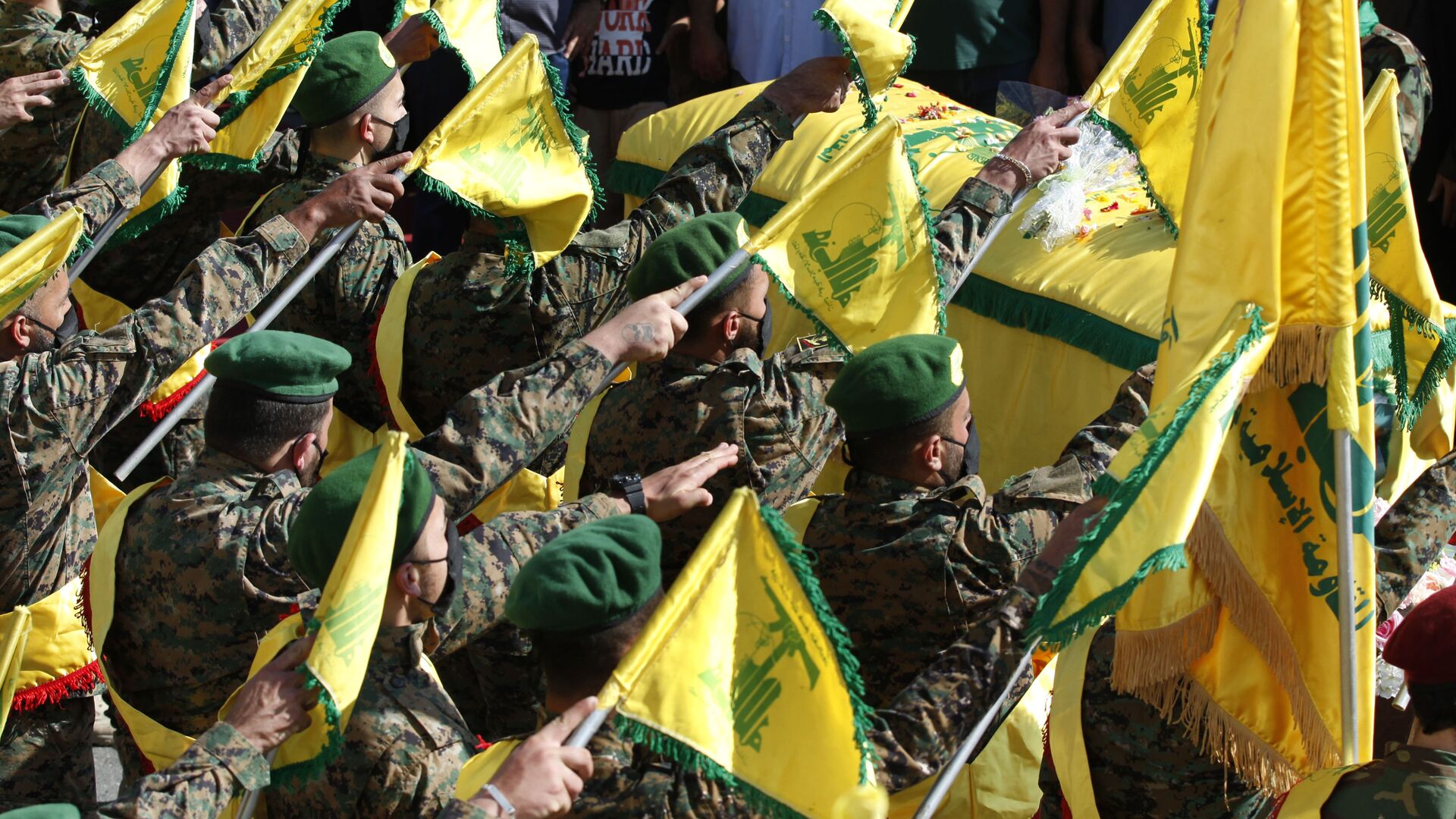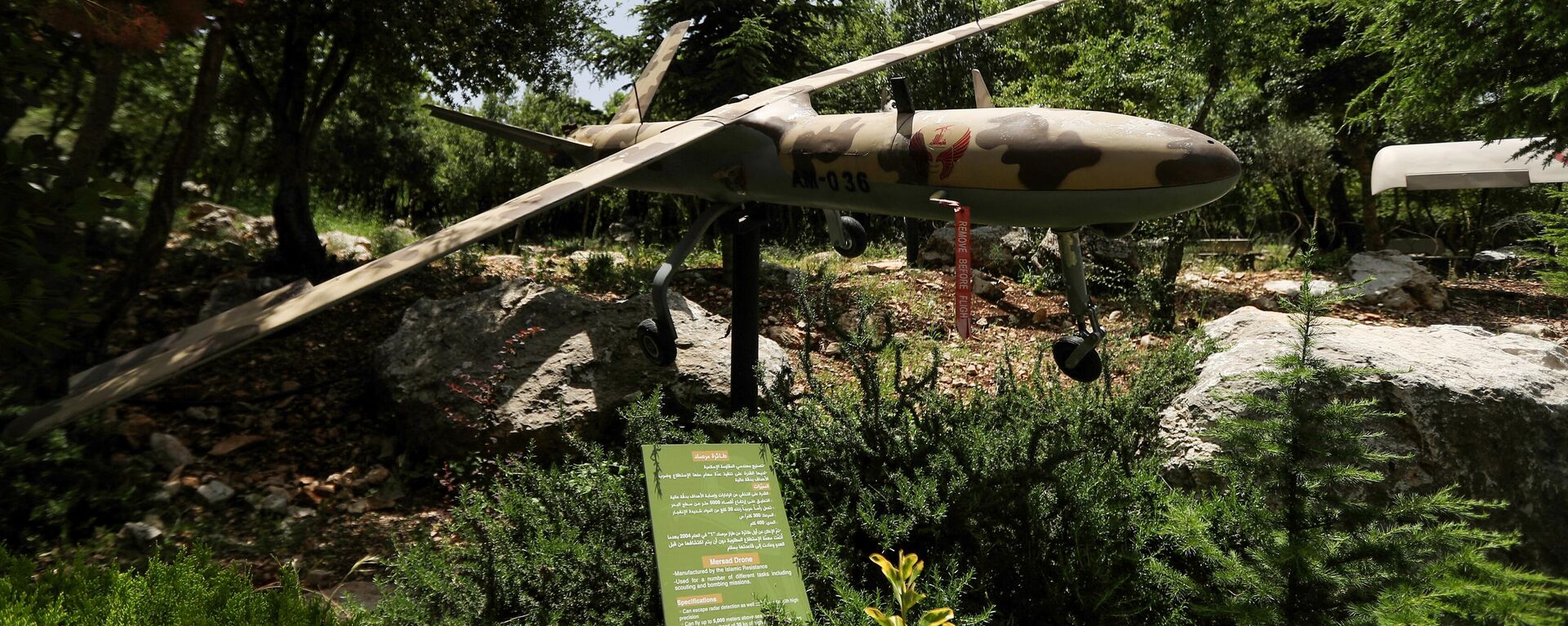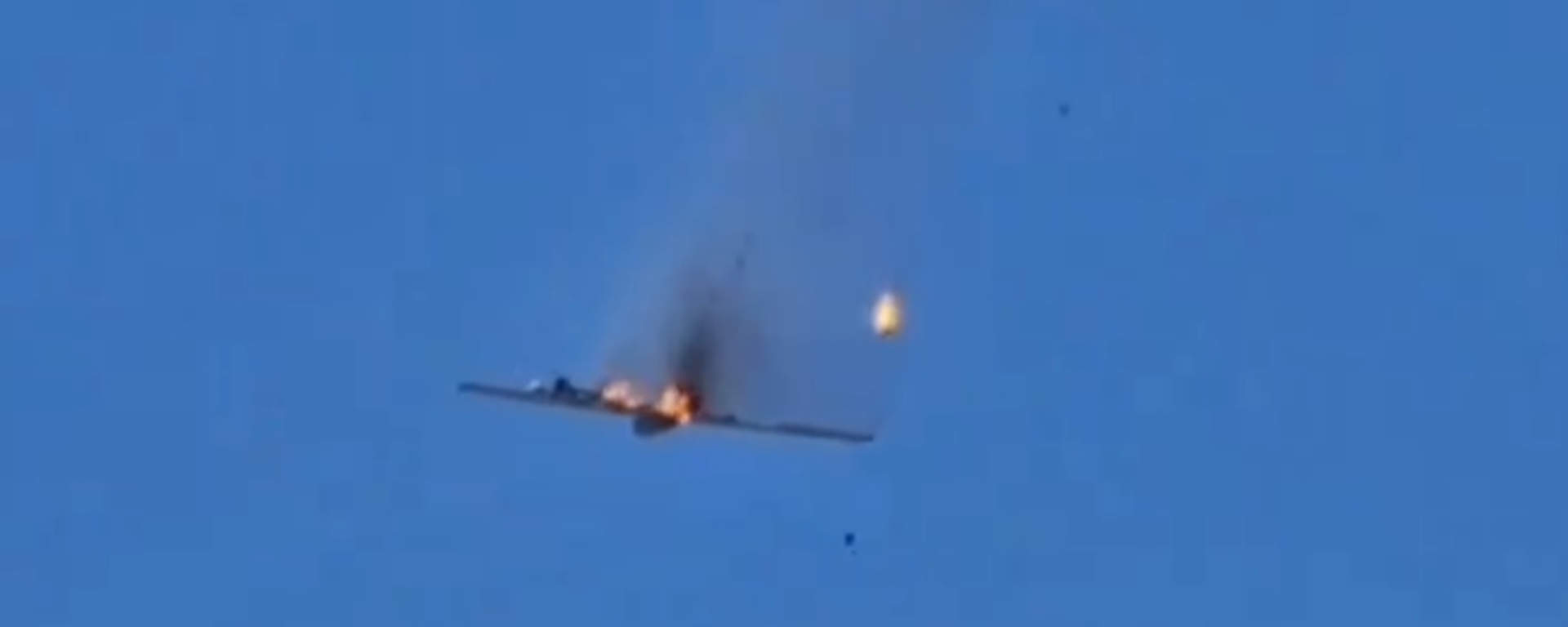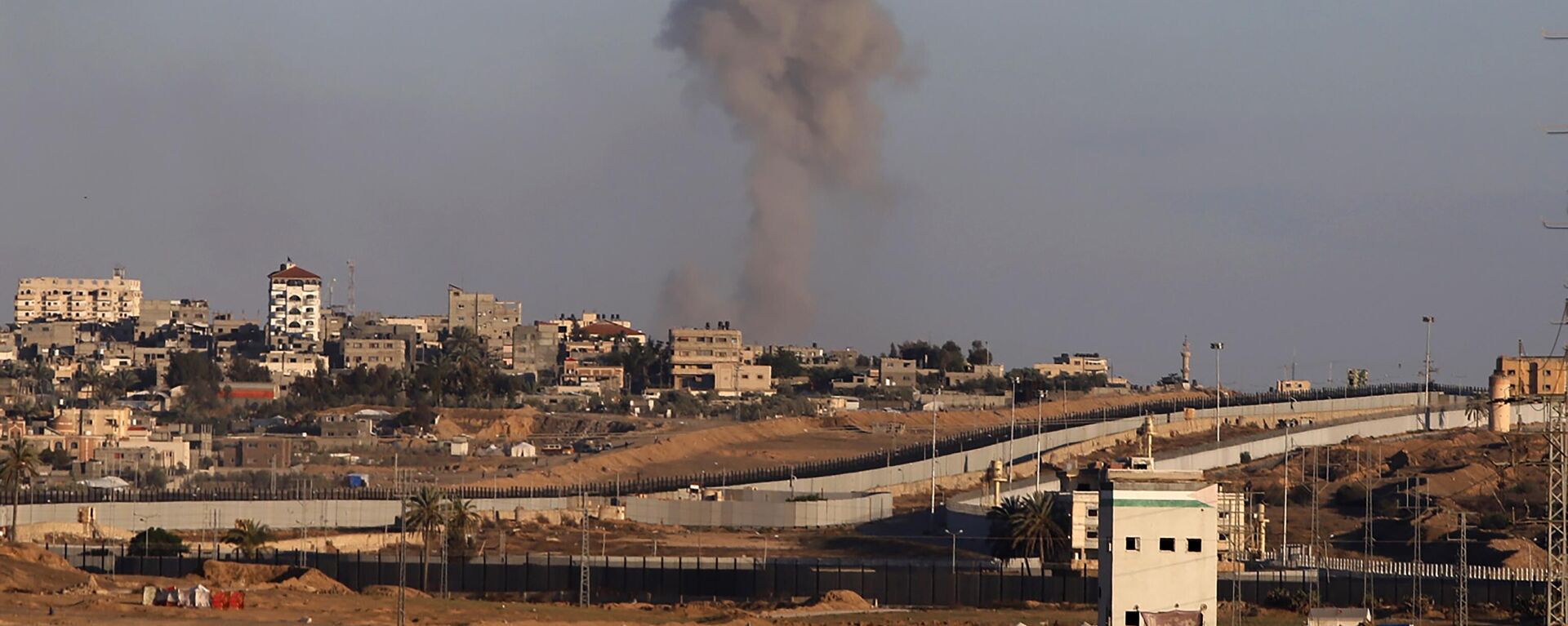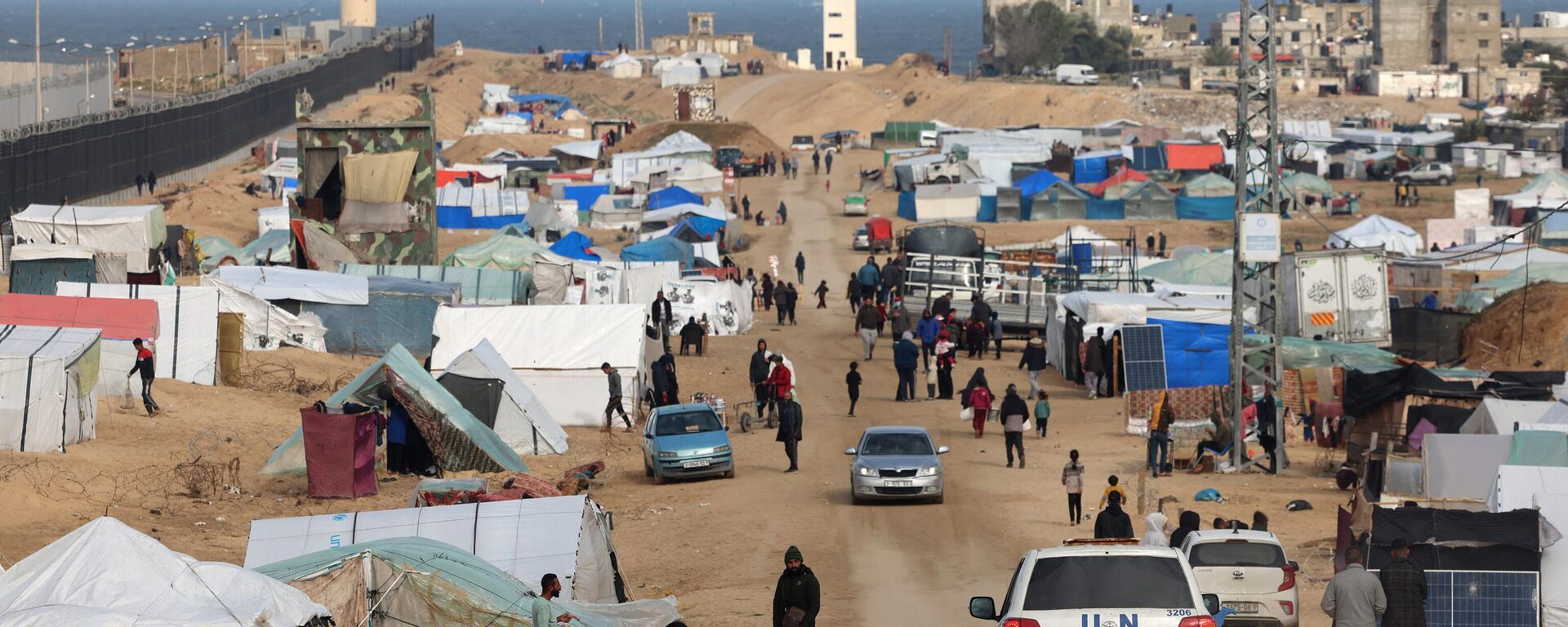https://sputnikglobe.com/20240603/hezbollah-employs-new-weapons-and-tactics-to-keep-israel-on-tenterhooks-1118756414.html
Hezbollah Employs New Weapons and Tactics to Keep Israel on Tenterhooks
Hezbollah Employs New Weapons and Tactics to Keep Israel on Tenterhooks
Sputnik International
The Lebanese Shiite movement has reportedly rolled out "sophisticated" new technology as clashes with Israel intensify in light of Tel Aviv's invasion of Rafah.
2024-06-03T15:01+0000
2024-06-03T15:01+0000
2024-06-03T15:01+0000
middle east
world
hassan nasrallah
benjamin netanyahu
palestinians
israel
tel aviv
rafah
hezbollah
hamas
https://cdn1.img.sputnikglobe.com/img/07e5/06/07/1083095973_0:160:3073:1888_1920x0_80_0_0_3440c94cd597024b0ea9fe21c96ab0b1.jpg
Hezbollah-Israel clashes have worsened of late as the Israel Defense Forces (IDF) continues its operation in Rafah, a southern Gaza region bordering with Egypt."By employing a variety of weapons and tactics, many of which remain unutilized, Hezbollah ensures that its full capabilities and potential battlegrounds are unpredictable. This strategy not only complicates Israel's defense calculations but also allows Hezbollah to retain the initiative in the conflict, adapting its strategy dynamically based on developments on the ground," the pundit continued.Hezbollah Secretary General Hassan Nasrallah warned Tel Aviv on May 24 about "new surprises" on the part of the Lebanese group if Israel doesn't halt hostilities in Gaza. The Israeli press cited El-Nashra, the Lebanese news agency, as alleging that "surprises" mentioned by Nasrallah are new weapons in the group's possession, including long-range precision missiles and anti-aircraft projectiles.Earlier this month, the Associated Press (AP) likewise emphasized new weapons and new tactics recently employed by the Shiite movement, including deeper strikes into Israel's territory. Hezbollah's outstanding military capabilities have been acknowledged by both Israeli and US think tanks, which suggest the group possesses at least 150,000 rockets and anti-tank missiles, along with up to 2,000 drones.In the second half of May, Hezbollah introduced new armored drones against Israeli military facilities, according to Dr. Lorenzo Trombetta, Beirut-based scholar and analyst specializing in the Middle East.On June 1, Hezbollah managed to down a second Israeli Hermes 900 unmanned aerial vehicle (UAV) over the southern Lebanese town of Deir Kifa. The first was destroyed over southern Lebanon on April 6. The group also fired two 500 kg Burkan missiles into northern Israel on Saturday with one of them reportedly hitting the Gibor Military Base near Kiryat Shmona. The group announced that it carried out 10 strikes on Saturday, targeting Israeli positions on both the eastern and western fronts.The Beirut-based analyst explained the escalation by Hezbollah's bid to step up pressure on Israel in order to stop hostilities in the Gaza Strip.To date, over 36,300 Palestinians have been killed and many more injured in Gaza, according to the Health Ministry. Israel's Rafah operation was launched amid bumpy truce negotiations with Hamas and has led to the displacement of over a million people and further exacerbated the ongoing humanitarian crisis in the Gaza Strip.Tel Aviv sent mixed signals concerning a new truce proposal on Sunday. Ophir Falk, Prime Minister Benjamin Netanyah’s chief foreign policy advisor, claimed that Israel had accepted the framework of a new deal to secure a ceasefire and the release of hostages. Defense Minister Yoav Gallant announced the same day that the goals of Israel's Gaza war – to completely dismantle the Hamas government and its military wing and to release hostages – have not changed. "We will not accept the rule of Hamas in Gaza at any stage in any process aimed at ending the war," he stressed.Hardline conservative members of Netanyahu's governing coalition – Finance Minister Bezalel Smotrich and National Security Minister Itamar Ben-Gvir – have pledged to leave the government if the latest truce proposal is accepted.
https://sputnikglobe.com/20240602/hezbollah-targets-israeli-iron-dome-battery-with-uavs-day-after-downing-idf-drone-1118747255.html
https://sputnikglobe.com/20240601/hezbollah-shoots-down-another-6-mln-israeli-hermes-drone-over-southern-lebanon-1118739276.html
https://sputnikglobe.com/20240602/unrwa-17-mln-displaced-to-other-areas-of-gaza-due-to-israels-rafah-operation-1118747794.html
https://sputnikglobe.com/20240601/egypt-us-israel-planning-to-discuss-reopening-of-rafah-checkpoint-on-sunday---reports-1118738187.html
israel
tel aviv
rafah
Sputnik International
feedback@sputniknews.com
+74956456601
MIA „Rossiya Segodnya“
2024
News
en_EN
Sputnik International
feedback@sputniknews.com
+74956456601
MIA „Rossiya Segodnya“
Sputnik International
feedback@sputniknews.com
+74956456601
MIA „Rossiya Segodnya“
israel's rafah operation, hezbollah attacks, hezbollah employs new tactics and weapons, hezbollah's secretary general sayyed hassan nasrallah, hassan nasrallah, the gaza strip, palestine, palestinians, gaza war, ceasefire in gaza
israel's rafah operation, hezbollah attacks, hezbollah employs new tactics and weapons, hezbollah's secretary general sayyed hassan nasrallah, hassan nasrallah, the gaza strip, palestine, palestinians, gaza war, ceasefire in gaza
Hezbollah Employs New Weapons and Tactics to Keep Israel on Tenterhooks
The Lebanese Shiite movement has reportedly rolled out "sophisticated" new technology as clashes with Israel intensify in light of Tel Aviv's invasion of Rafah.
Hezbollah-Israel clashes have worsened of late as the Israel Defense Forces (IDF) continues its operation in Rafah, a southern Gaza region bordering with Egypt.
"Hezbollah's decision to launch an attack using drones and projectiles, including precision-guided missiles, reflects a strategic approach aimed at maintaining an element of surprise and keeping Israel in a state of constant recalibration," Dr. Imad Salamey, associate professor of political science and international affairs at the Lebanese American University, told Sputnik.
"By employing a variety of weapons and tactics, many of which remain unutilized, Hezbollah ensures that its full capabilities and potential battlegrounds are unpredictable. This strategy not only complicates Israel's defense calculations but also allows Hezbollah to retain the initiative in the conflict, adapting its strategy dynamically based on developments on the ground," the pundit continued.
Hezbollah Secretary General Hassan Nasrallah warned Tel Aviv on May 24 about "new surprises" on the part of the Lebanese group if Israel doesn't halt hostilities in Gaza. The Israeli press cited El-Nashra, the Lebanese news agency, as alleging that "surprises" mentioned by Nasrallah are new weapons in the group's possession, including long-range precision missiles and anti-aircraft projectiles.
Earlier this month, the Associated Press (AP) likewise emphasized new weapons and new tactics recently employed by the Shiite movement, including deeper strikes into Israel's territory. Hezbollah's outstanding
military capabilities have been acknowledged by both Israeli and US think tanks, which suggest the group possesses at least 150,000 rockets and anti-tank missiles, along with up to 2,000 drones.
In the second half of May, Hezbollah introduced new armored drones against Israeli military facilities, according to Dr. Lorenzo Trombetta, Beirut-based scholar and analyst specializing in the Middle East.
"Nowadays [the Shiite group] is continuing to test these new capabilities in order to respond to Israel, first of all, as Israel is also increasing its attacks along the blue line, as we've seen in the Bekaa Valley and southern side of the city of Sidon, and moreover, to counter the balance of power and continue to exert pressure, political pressure, military pressure on the Israeli government," Trombetta told Sputnik.
On June 1, Hezbollah managed to down
a second Israeli Hermes 900 unmanned aerial vehicle (UAV) over the southern Lebanese town of Deir Kifa. The first was destroyed over southern Lebanon on April 6. The group also fired two 500 kg Burkan missiles into northern Israel on Saturday with one of them reportedly hitting the Gibor Military Base near Kiryat Shmona. The group announced that it carried out 10 strikes on Saturday, targeting Israeli positions on both the eastern and western fronts.
"In terms of capabilities, Hezbollah didn't use so many sophisticated weapons until now," Trombetta pointed out. "It resorted to more or less short-range rockets and missiles. And lately, in the last two months, it showed its capability to shut down the big Israeli Hermes-500 armored drone. As I mentioned before, there is a gradual escalation in referring to more and more modern and sophisticated weaponry from Hezbollah."
The Beirut-based analyst explained the escalation by Hezbollah's bid to step up pressure on Israel in order to stop hostilities in the Gaza Strip.
"We should not forget that, alongside the almost 90,000 displaced people in southern Lebanon, we have around 80,000 displaced people in the upper Galilee in Israel. We know that these communities are exerting huge pressure on the Netanyahu government," he noted.
To date, over 36,300 Palestinians have been killed and many more injured in Gaza, according to the Health Ministry. Israel's Rafah operation was launched amid bumpy truce negotiations with Hamas and has led to the displacement of
over a million people and further exacerbated the ongoing humanitarian crisis in the Gaza Strip.
Tel Aviv sent mixed signals concerning a new truce proposal on Sunday. Ophir Falk, Prime Minister Benjamin Netanyah’s chief foreign policy advisor, claimed that Israel
had accepted the framework of a new deal to secure a ceasefire and the release of hostages. Defense Minister Yoav Gallant announced the same day that the goals of Israel's Gaza war – to completely dismantle the Hamas government and its military wing and to release hostages – have not changed.
"We will not accept the rule of Hamas in Gaza at any stage in any process aimed at ending the war," he stressed.
Hardline conservative members of Netanyahu's governing coalition – Finance Minister Bezalel Smotrich and National Security Minister Itamar Ben-Gvir – have pledged to leave the government if the latest truce proposal is accepted.
"So we should look at the overall picture of continuing negotiations between Hamas and Israel through Qatar, Egypt mediation. But overall, between the US and Iran there is no agreement in sight between these two main poles, main forces, main axes," Trombetta concluded.
